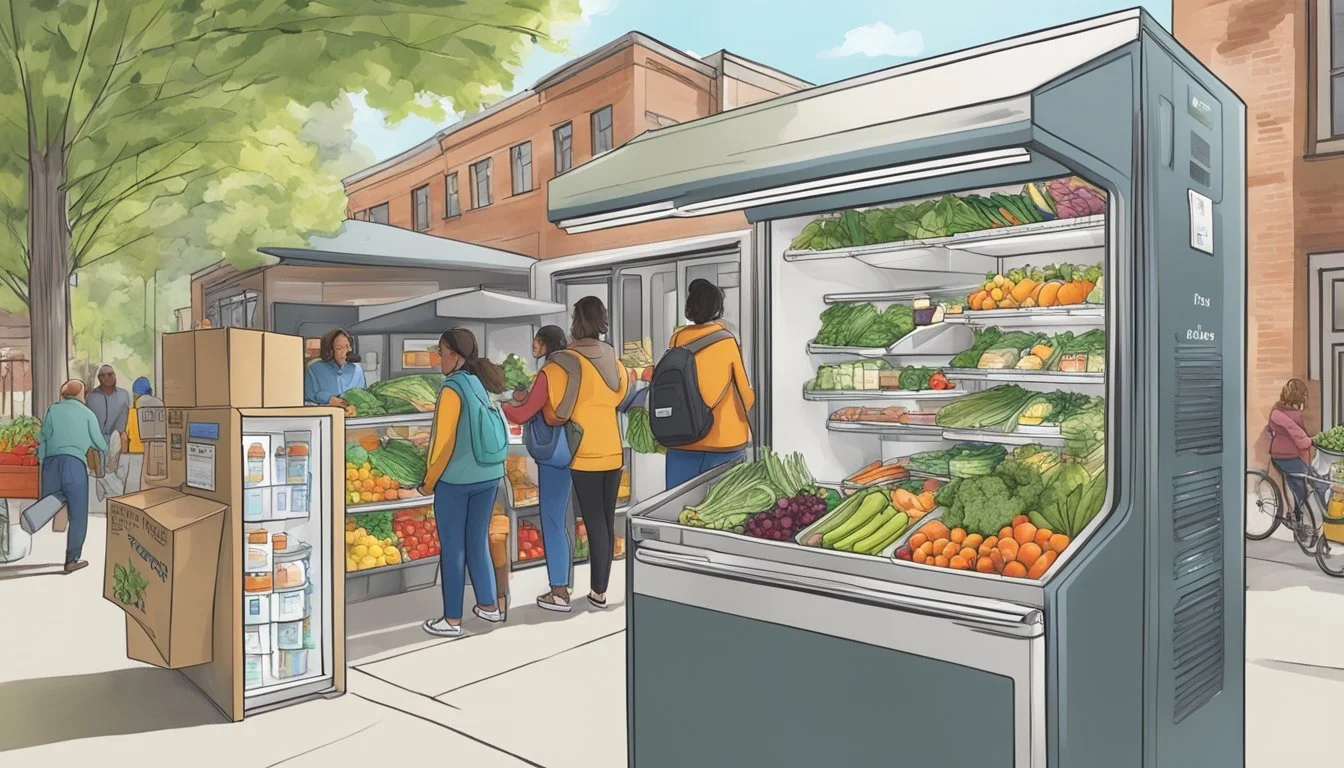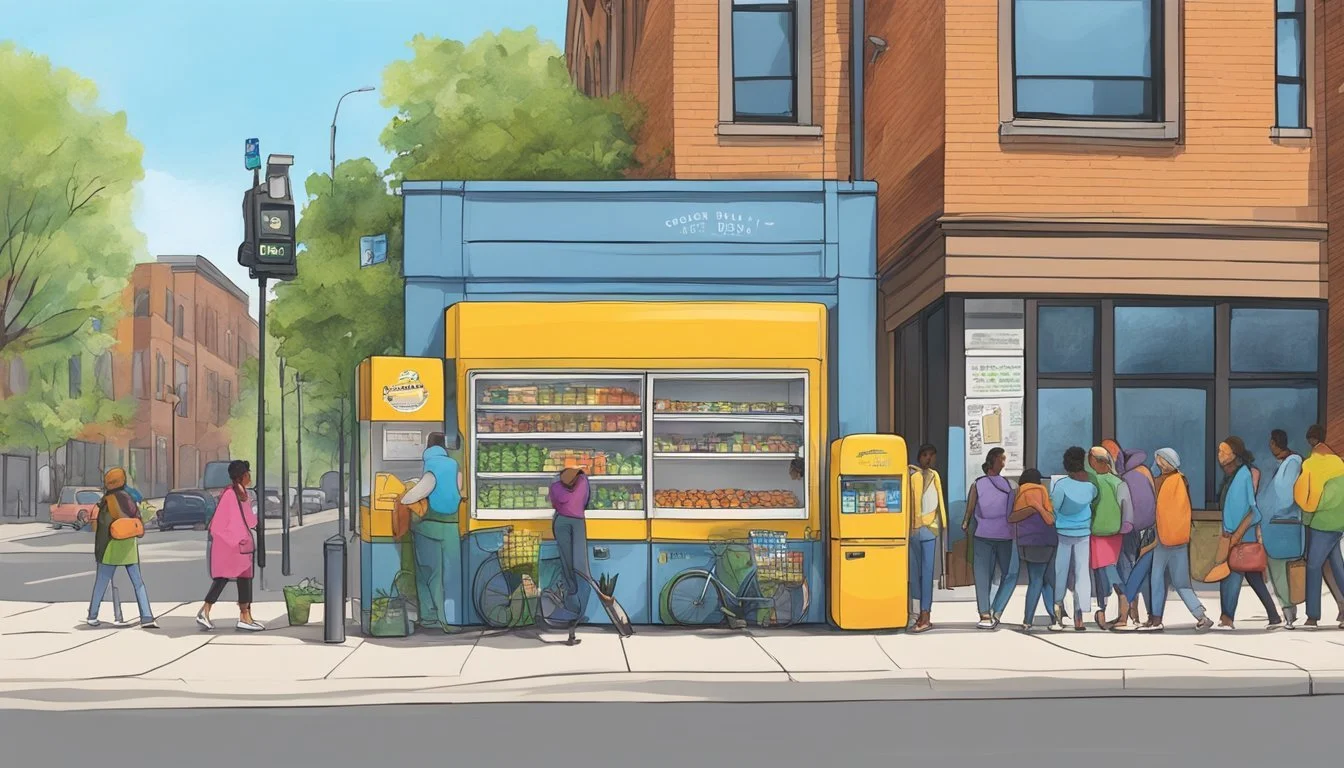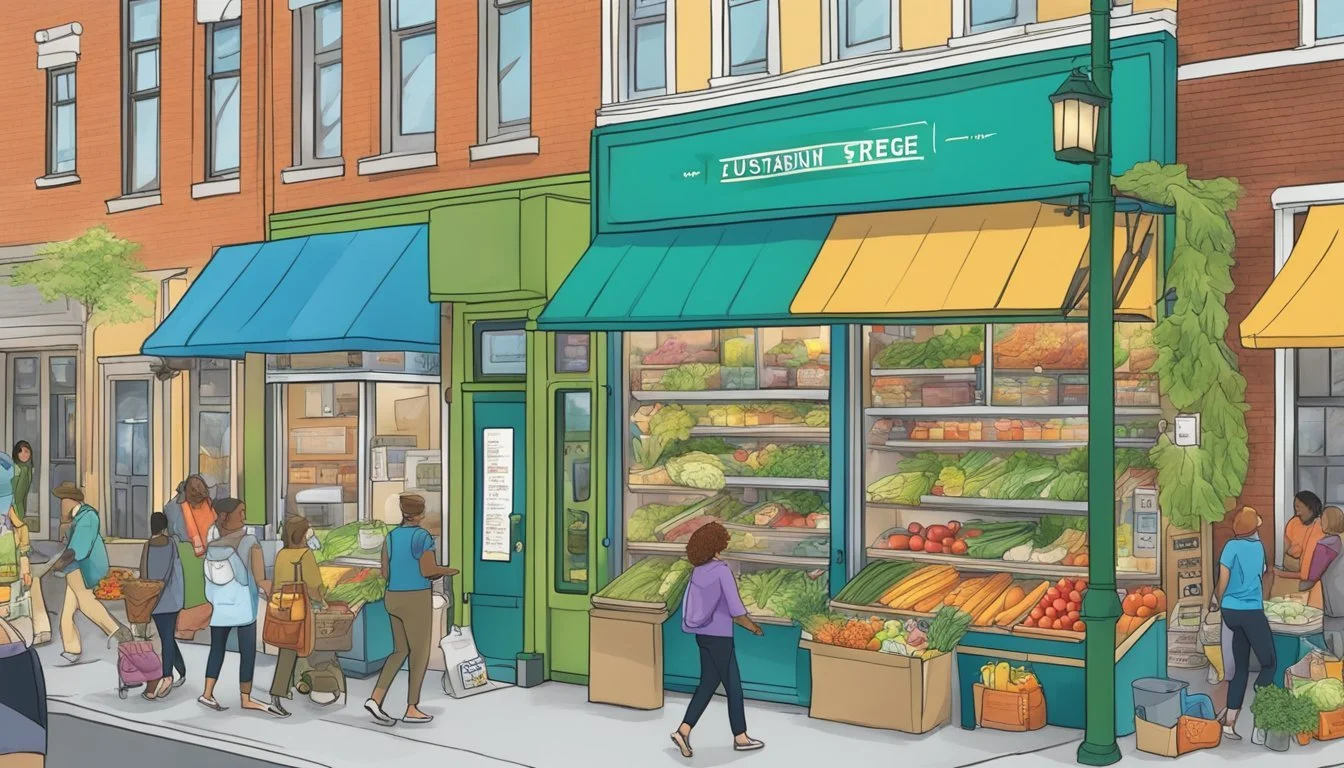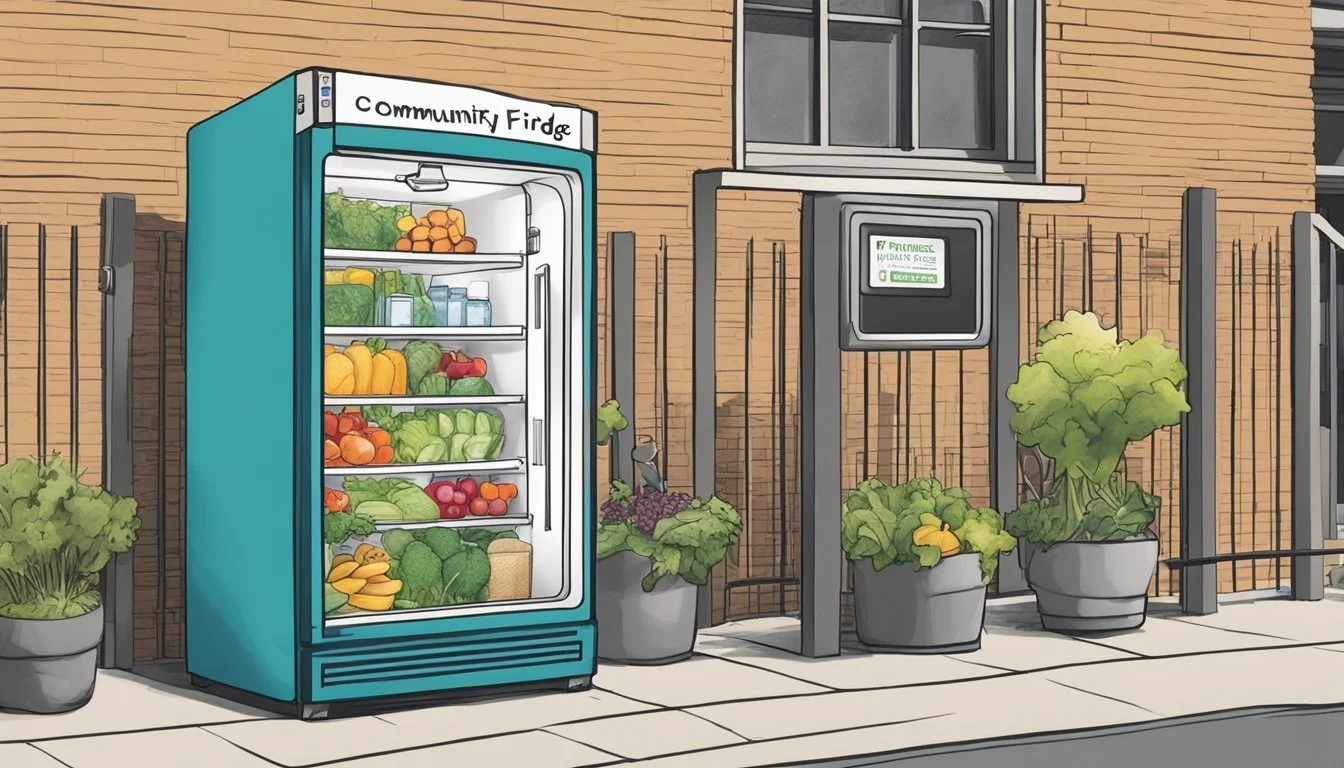Ann Arbor, MI Community Fridge
Nourishing Local Unity Through Shared Resources
Ann Arbor, Michigan, a city known for its vibrant community and the prestigious University of Michigan, is also home to a novel initiative aimed at tackling food insecurity: the Community Food Fridge. This fridge provides a communal space where residents can access fresh food without the typical restrictions that come with traditional food bank models. The fridge operates on the principle of take what you need, give what you can, making it an accessible option for all, regardless of their circumstances.
The initiative's success is underpinned by the generosity of local restaurants, vendors, and grocery stores, who contribute to ensuring the fridge is stocked with wholesome options. Set up at the Community Center of 701 Miller in the Water Hill neighborhood, the Community Food Fridge embodies Ann Arbor’s collective commitment to supporting community members in need. With no stringent operating days or hours, it offers unparalleled accessibility, allowing individuals to obtain food at their convenience.
As the fridge gains traction, it stands as a testament to the power of community-led solutions in addressing societal challenges. The project not only provides sustenance but also fosters a sense of solidarity among Ann Arbor residents, proving that communal efforts can create sustainable models of support within a neighborhood.
Community Food Fridge Overview
In Ann Arbor, Washtenaw County, Michigan initiatives aim to reduce food insecurity and promote community sharing, with Gigi's Community Food Fridge being a notable example. Gigi’s initiative represents a growing movement towards communal resources that provide free food to those in need while also reducing waste.
This innovative model offers a more accessible approach to food assistance. Unlike traditional food banks, which operate during specific hours, community food fridges enable anyone to access or donate food items at any time. This flexibility helps address the challenges some face in obtaining essential nutrition.
Location and Accessibility:
Ann Arbor, MI has embraced Gigi's Community Food Fridge, which is strategically placed for easy community access.
Washtenaw County endorses this project as part of wider efforts to tackle food scarcity issues within the region.
Funding and Support:
A combination of local support and grants has allowed for the establishment of Gigi's Community Food Fridge.
Support from organizations like ChangeX and Nickelodeon highlights the project's impact and growing recognition.
Goals of Gigi’s Community Food Fridge:
Reduce Food Waste: Encourage food sharing to minimize waste.
Enhance Food Security: Provide a reliable food source for residents.
Foster Community Spirit: Strengthen community bonds through collective care and support.
Community fridges like Gigi's offer a practical solution where individuals can contribute to the well-being of their neighbors, underscoring the communal spirit of Ann Arbor.
Origin and Purpose
Gigi's Community Food Fridge initiative in Ann Arbor, Michigan, was founded to address critical issues surrounding food insecurity and environmental sustainability. Its inception serves as a beacon of community support and a step towards reducing waste.
Addressing Food Insecurity
In Ann Arbor, Gigi's Community Food Fridge emerged as a powerful response to combat food insecurity. The project's motivation is firmly rooted in supporting families, individuals on Supplemental Security Income (SSI), and those impacted by poverty. By offering an accessible hub at 701 Miller in the Water Hill neighborhood, the community fridge enables residents to obtain perishable and non-perishable goods, thus helping bridge the gap between food availability and need.
Environmental Impact and Sustainability
The community fridge not only alleviates food insecurity but also contributes to environmental sustainability. By re-distributing excess food that vendors, restaurants, and grocery stores donate, Gigi's initiative actively reduces carbon emissions and landfill waste. This approach conserves natural resources and mitigates environmental stressors. Ann Arbor's embrace of Gigi's Community Food Fridge exemplifies a commitment to sustainability and fostering a circular economy that benefits both people and the planet.
Getting Involved
Community fridges in Ann Arbor offer a unique opportunity for individuals to contribute towards food sustainability and community welfare. Participation can take the form of volunteering time and effort or donating food and resources.
Volunteering
Volunteers are essential for the operation and maintenance of community fridges. They ensure the fridge is clean, organized, and stocked with food. Habitat for Humanity often collaborates with local initiatives, offering opportunities to those interested in contributing to the sustainability and well-being of the community. Volunteering could include:
Food sorting and distribution: Keeping the fridge stocked with fresh, usable produce.
Cleaning and maintenance: Regular checks to ensure the fridge remains hygienic and functional.
For those looking to volunteer, they can reach out to the fridge's organizing committee, which can be found through local community hubs or online platforms dedicated to the Ann Arbor Community Fridge project.
Donating
Donations keep community fridges viable and directly help those in need. Restaurants and individuals can donate surplus food that is still safe to consume. Monetary donations are also crucial for covering ongoing costs like electricity, which, for example, can average around $150 annually for fridge hosts in similar projects. Here are ways to donate:
Food Donations:
Restaurants can contribute excess meals or ingredients.
Individuals can donate fresh produce or packaged items.
Financial Support:
Direct financial contributions to cover operational costs.
Purchase necessary items like cleaning supplies or additional resources for the fridge.
Donors can contact the fridge organizers for specifics on acceptable food items and the best times to bring donations. It's important for donors to ensure that food contributions are safe and align with the food safety standards set by the community fridge guidelines.
Operation and Management
The operation and management of the Ann Arbor Community Fridge are meticulously designed to ensure that the program is both sustainable and effective in serving the community. These aspects include diligent site scouting, regular stocking and maintenance, and strict adherence to health and safety standards.
Locations and Scouting
The selection of sites for the community fridges involves strategic placement in accessible locations to maximize community impact. Locations are chosen based on factors such as foot traffic, community need, and safety. Local restaurants and businesses often provide support, with partnerships aiding both the program’s visibility and logistical operations.
Stocking and Maintenance
Regular maintenance ensures the fridge is consistently stocked with non-perishables and fresh food items. Stocking protocols involve community volunteers, who follow a schedule to check and replenish supplies. Proper storage solutions, like reusable food containers and heat bags, are used to preserve food quality, while shelving within the fridge is organized with the aid of label makers, markers, and dry erase boards to mark donation dates and contents clearly.
Health and Safety
Health and safety are paramount in the operation of the Community Fridge. Food safety gloves and hand sanitizer are provided for volunteers to minimize contamination risks. All items placed in the fridge must meet safety regulations and expiration date requirements. Regular **cleaning schedules and SSI (Supplemental Security Income) eligibility do not impact an individual's ability to access the fridge, promoting a community-driven approach that encompasses all demographics.
Community Engagement and Support
Ann Arbor, Michigan showcases a model of community engagement and support, prominently through initiatives like the Community Fridge, where collaboration with local organizations enhances the city's ability to address food insecurity and foster local involvement.
Partner Organizations
Partner organizations play a critical role in the success and sustainability of community projects such as the Ann Arbor Community Fridge. Habitat for Humanity of Huron Valley and the Habitat for Humanity ReStore are key collaborators, contributing to the project's goals of reducing waste and feeding the community. They channel resources and volunteer opportunities to address the needs of the local population. The Ann Arbor Community Center and Friends in Deed also actively participate, strengthening the network that supports these community-driven efforts.
Public Inquiries and Communication
Effective communication channels are essential for fostering public inquiries and maintaining community support. Queries regarding the Community Fridge and related initiatives can be directed through several means:
Ask: To gather information or volunteer, community members can make inquiries directly through the city's designated platforms.
Email: Email serves as a direct and formal channel for community members to request information or support.
Mail: Traditional mail is used less frequently but remains available for reaching out to organizations involved in community projects.
Contact Method Description Ask For swift information and responses to volunteer Email Preferred for detailed requests and document submission Mail Utilized for official correspondence and material contributions
Immediate responses to emails and requests solidify the relationship between community projects and residents, ensuring an ongoing dialogue that fosters inclusivity and active engagement.
Funding and Resources
The successful operation of the Ann Arbor Community Fridge relies on a carefully managed budget and the generosity of local donors. Resources are allocated efficiently to sustain the project, ensuring community needs for accessible nutrition are met.
Budgeting and Expenses
The Community Fridge initiative operates on a budget that accounts for the acquisition, maintenance, and operational costs. These costs include, but are not limited to:
Fridge purchase and installation
Regular maintenance and cleaning services
Electricity to power the fridge
Insurance to cover liability concerns
A detailed budget ensures that funds are effectively utilized to prevent food waste and support the local Ann Arbor community.
Donations and Contributions
Generosity from individuals, local businesses, and community groups is instrumental to the fridge's sustenance. Donations come in various forms:
Monetary Donations: Provided by community members and local grants such as the Sustaining Ann Arbor Together (SA2T) Neighborhood Grant Program.
Food Donations: Offered by local vendors, restaurants, grocery stores, and residents willing to donate excess good food.
The community fridge project welcomes everyone to contribute, and every donation, whether big or small, has a direct impact on community welfare.
Programs and Initiatives
Ann Arbor's commitment to community support is evident through its various programs, particularly those focusing on providing food assistance and educational resource sharing. These initiatives help ensure that all members have access to basic necessities and knowledge enrichment opportunities.
Holiday Drives
During the holiday season, Ann Arbor's community fridge programs are particularly active. Holiday Drives are organized to collect non-perishable food items with an emphasis on the spirit of giving around Christmas. Volunteers and local organizations come together to ensure the fridge is well-stocked. Here's how the community contributes:
Non-perishables collected: Over 50 lbs collected and ongoing efforts.
Local restaurant donations: Various eateries pledge food contributions to support the fridge during this critical time.
These dedicated collections help to share warmth and sustenance during the colder months, where the need for food and heat can be more pressing.
Educational Programs
Educational Programs associated with the community fridge not only distribute food but also share valuable Seeds of Knowledge. These initiatives are designed to foster sustainability and provide hands-on learning experiences.
Sustainable Environmental Education Resources (SER): Programs engaged in teaching the importance of environmental stewardship.
Soil and Agriculture Education (SDA): Workshops teaching the basics of planting, nurturing, and harvesting crops.
By imparting practical skills such as growing one’s own food, the community fridge program helps ensure long-term food security for residents. These education efforts cultivate a strong understanding of sustainability within the Ann Arbor community.
Contact Information
The following contact methods are essential for anyone seeking information or wishing to contribute or participate in the Ann Arbor Community Fridge initiatives.
Main Contact Methods
Email and Phone: The primary mode of communication for inquiries related to community fridge projects in Ann Arbor, especially pertinent for arranging donations, volunteer opportunities, and access information is typically over email or phone. Most organizations will have an email address provided for contact, or a central phone number that routes the caller to the required department.
Fax: While less common, some entities may still use fax for formal documentation and correspondences regarding contributions or coordination efforts for the community fridge.
Address: For those preferring or requiring in-person interactions, knowing the physical address is crucial. Ann Arbor Community Fridge locations such as the one mentioned at 701 Miller at the Community Center can be one of the specific sites to visit.
Contact Method Details Email Specific email addresses can often be found on organizational websites or flyers regarding community fridge initiatives. Phone A general phone number is typically available for direct support and information. Fax If available, the fax number will be for formal communications and official documents. Address Visit the location at 701 Miller at the Community Center for the Water Hill neighborhood community fridge.
Entities looking to learn more or get involved should reach out through these channels to acquire more information and offer their support.










